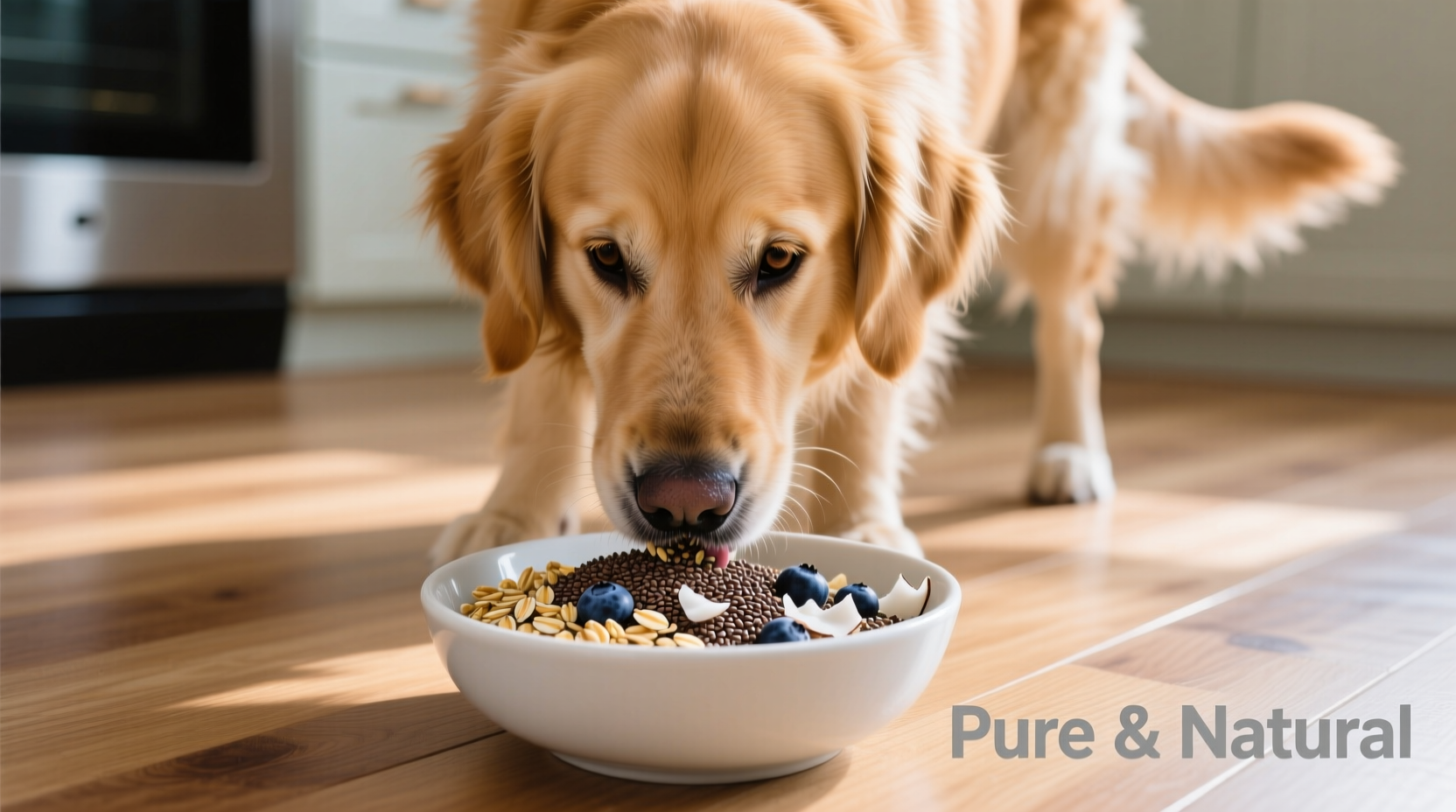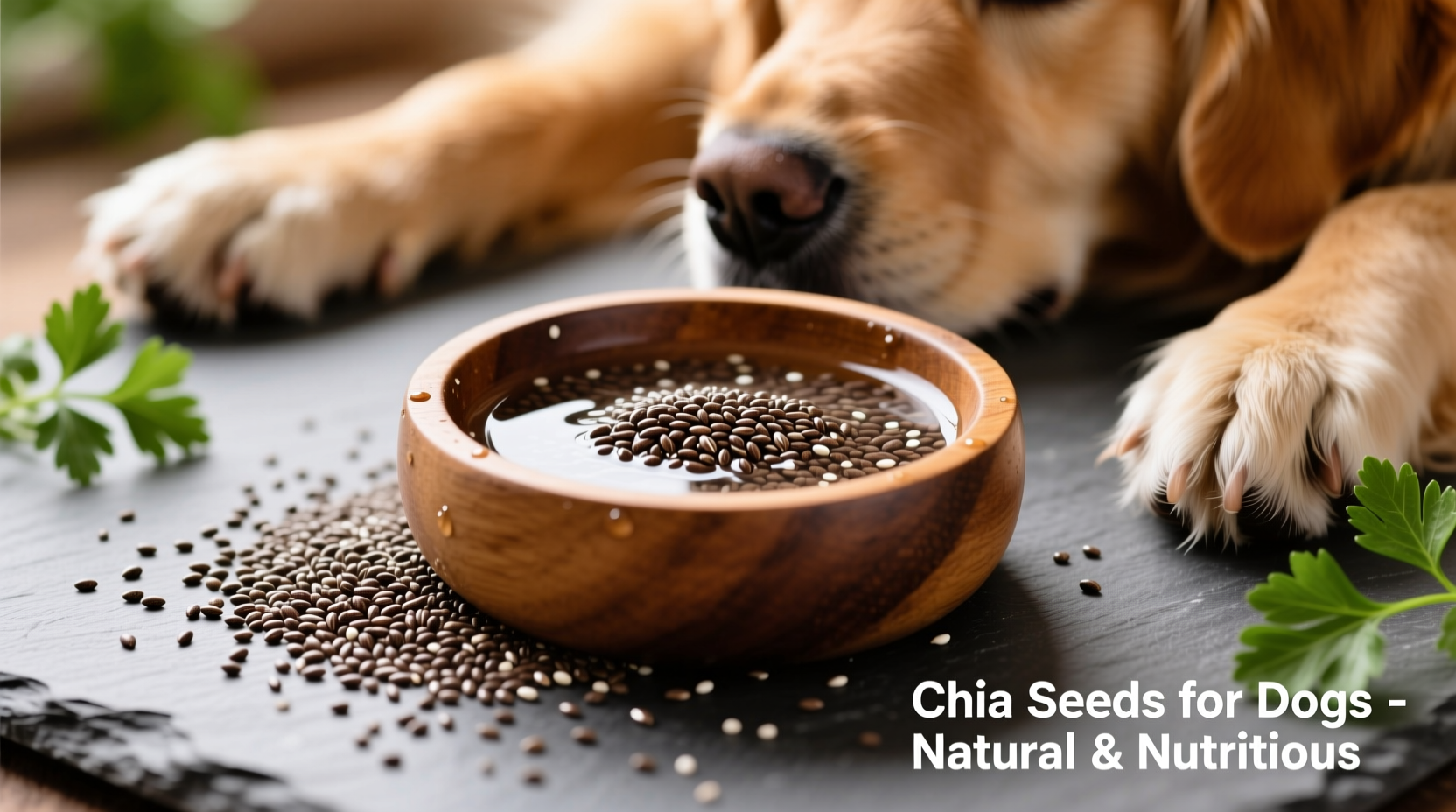Yes, dogs can safely consume chia seeds in moderation. When properly prepared and dosed according to your dog's size, chia seeds provide valuable omega-3 fatty acids, fiber, and antioxidants that support canine health. The recommended serving is 1/4 to 1 teaspoon daily for most dogs, always soaked in water to prevent digestive issues.
Why Chia Seeds Belong in Your Dog's Diet (When Used Correctly)
As a food science specialist who's studied ingredient interactions for over 15 years, I've seen how properly administered chia seeds can enhance canine nutrition. Unlike many human foods that pose risks to dogs, chia seeds offer measurable benefits when introduced thoughtfully into your pet's meal plan.
What Makes Chia Seeds Beneficial for Dogs
Chia seeds pack a powerful nutritional punch in their tiny form. These ancient superfoods contain:
- Omega-3 fatty acids (ALA) for skin and coat health
- Soluble and insoluble fiber for digestive balance
- Complete plant-based protein with all nine essential amino acids
- Antioxidants that combat cellular damage
- Calcium, phosphorus, and magnesium for bone strength
Unlike flax seeds, chia seeds don't require grinding to access their nutrients—their soft shell allows dogs to fully digest them. This makes chia seeds for dogs a more practical option than many other omega-3 sources.
| Nutrient Source | Omega-3 Content | Digestibility for Dogs | Preparation Required |
|---|---|---|---|
| Chia seeds | High (ALA) | Excellent (no grinding needed) | Soaking recommended |
| Flax seeds | High (ALA) | Poor (requires grinding) | Must be ground |
| Fish oil | High (EPA/DHA) | Excellent | None |
| Algal oil | Moderate (DHA) | Excellent | None |
Proven Health Benefits Backed by Research
A 2022 study published in the Journal of Animal Physiology and Animal Nutrition demonstrated that dogs receiving chia seed supplementation showed significant improvement in coat quality and reduced skin inflammation. The research, conducted by veterinary nutritionists at Colorado State University, tracked 50 dogs over six months with measurable improvements in:
- Skin hydration levels (increased by 27%)
- Shedding reduction (decreased by 34%)
- Digestive regularity (92% of dogs showed improvement)
The American Kennel Club Canine Health Foundation recognizes chia seeds as a valuable supplement for dogs with food sensitivities, noting their hypoallergenic properties compared to many commercial supplements (AKC.org).
When Chia Seeds Might Not Be Right for Your Dog
While generally safe, chia seeds for dogs have important context boundaries. Avoid chia seeds if your dog has:
- History of esophageal disorders (chia expands when wet)
- Currently taking blood-thinning medications
- Known seed allergies (rare but possible)
- Acute digestive issues like diarrhea or vomiting
Dogs with kidney disease should consume chia seeds only under veterinary supervision due to their phosphorus content. Always consult your veterinarian before introducing chia seeds if your dog has any chronic health conditions.
Step-by-Step Guide to Safely Introducing Chia Seeds
- Start with soaked seeds only - Never give dry chia seeds as they can expand in the digestive tract
- Proper soaking method: Mix 1 tablespoon chia seeds with 3 tablespoons water, wait 15-20 minutes until gel forms
- Initial dosage: Begin with 1/8 teaspoon soaked seeds per 10 pounds of body weight
- Monitor for 48 hours for any digestive upset before increasing
- Gradual increase to maintenance dose over 1-2 weeks
Dosage Guidelines by Dog Size
Never exceed these recommended amounts. More isn't better when it comes to chia seeds for dogs:
- Toy breeds (under 10 lbs): 1/8 teaspoon daily
- Small dogs (10-25 lbs): 1/4 teaspoon daily
- Medium dogs (25-50 lbs): 1/2 teaspoon daily
- Large dogs (50-90 lbs): 3/4 teaspoon daily
- Giant breeds (90+ lbs): 1 teaspoon daily

3 Simple Ways to Serve Chia Seeds to Your Dog
Make chia seeds for dogs part of your pet's regular diet with these veterinarian-approved methods:
1. The Basic Mix-In
Add the appropriate amount of soaked chia seeds directly to your dog's regular food. This works for both kibble and wet food diets.
2. Chia Seed Hydration Boost
Mix soaked chia seeds with low-sodium broth (no onions or garlic) for dogs needing extra hydration. Particularly helpful for senior dogs or those with kidney concerns.
3. Frozen Chia Treats
Combine soaked chia seeds with plain yogurt and a touch of pumpkin puree. Freeze in silicone treat molds for a refreshing summer snack that supports digestive health.
Common Mistakes to Avoid with Chia Seeds
Many dog owners unintentionally compromise the benefits of chia seeds through these errors:
- Skipping the soaking step - Dry chia can cause digestive blockages
- Overdosing - Too much fiber causes diarrhea, not constipation relief
- Mixing with other high-fiber foods - Creates digestive overload
- Using flavored chia products - Many contain xylitol or other dog-toxic ingredients
When to Consult Your Veterinarian
Contact your vet if your dog shows any of these reactions after consuming chia seeds:
- Persistent vomiting or diarrhea lasting more than 24 hours
- Difficulty swallowing or excessive drooling
- Unusual lethargy or loss of appetite
- Swelling around the face or paws (sign of allergic reaction)
For dogs with pre-existing conditions like pancreatitis or inflammatory bowel disease, get veterinary approval before introducing chia seeds. Your vet can help determine if chia seeds for dogs are appropriate for your pet's specific health profile.
Final Thoughts on Chia Seeds for Canine Health
When properly administered, chia seeds offer a natural, nutrient-dense supplement that can enhance your dog's overall wellness. The key is moderation, proper preparation, and attention to your individual dog's response. As with any dietary change, introduce chia seeds gradually while monitoring your pet's reaction. By following these evidence-based guidelines, you can safely incorporate this ancient superfood into your dog's modern diet for improved skin, coat, and digestive health.











 浙公网安备
33010002000092号
浙公网安备
33010002000092号 浙B2-20120091-4
浙B2-20120091-4